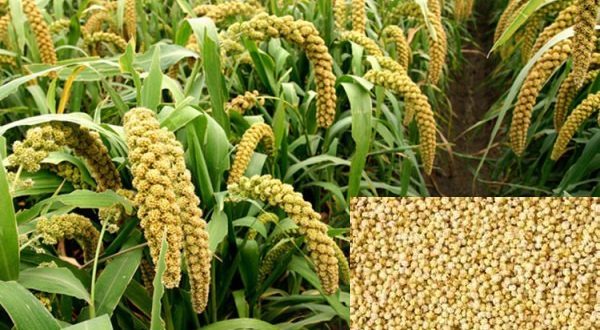Millets are tiny, spherical grains. These come in different colors like white, gray, yellow and even deep red. The botanical name of millet is Eleusine Coracana. According to archaeologists, millet was first cultivated in East Asia as far as 10,000 years back.
Millet is filled with nutrients. It contains around 15 % of protein and is rich in fiber. It is a rich source of Vitamin E, B complex, niacin, thiamin and riboflavin. In addition, millet also contains essential amino acids like methionine and lecithin and minerals like iron, magnesium, phosphorus and potassium. Millet is also known as ‘Bajra’ in Hindi, ‘Sajjalu’ in Telugu, ‘Kambu’ in Tamil, ‘Bajri’ in Marathi, ‘Kambam’ in Malayalam, ‘Sajje’ in Kannada, and ‘Vari’ in Gujarati.
Here are some of the benefits of millets:
Treats Coronary Artery Disorder: Consumption of millet in large amounts helps decrease triglyceride levels in the body. It thins the blood to prevent blood platelet clumping, thereby reducing the risk of sunstroke and coronary artery disorder.
Helps to protect against diabetes: Millet is a good source of magnesium, which is known to increase the effectiveness of insulin in the body and help to avoid diabetes developing. Studies have proven that people who eat a diet rich in magnesium have up to 30% less chance of developing Type 2 diabetes.
Prevents anaemia: Millet contains a perfect combination of ingredients to combat iron deficiency in the body. It has iron, which is what is needed to fight anaemia, but it also contains Vitamin C, which helps the body to absorb the iron into the bloodstream. Eating millet is said to be an even more effective remedy for anaemia, than taking simple iron supplements.
Reduces Risk of Colon Cancer: Millet contains both fiber and phytonutrients, the combination of which is believed to reduce the risk of developing colon cancer. Lignan, a phytonutrient in millet, is converted into mammalian lignan in our intestine that protects us from breast cancer. In fact, consumption of millet can lower the risk of developing breast cancer by 50%.
Good Source of Antioxidants: The high amount of antioxidants present in millets fights free radicals present in the body which slows down the ageing process.
Is Good For Your Heart: As a good source of magnesium, millets help lower blood pressure and reduce the risk of heart attacks and strokes caused by atherosclerosis – a condition where arteries become narrower due to fatty deposits on their inner walls. Millets also contain substantial amounts of potassium, another heart-friendly mineral. Animal studies show that proso and finger millets can even improve the levels of high-density lipoproteins (HDL) or “good” cholesterol.
Helps you to relax: Millet contains the amino acid, tryptophan, which works as a natural relaxant. It will help you to feel less stressed out during the day and it will help you sleep better at night. The relaxing properties of millet can also help to reduce blood pressure, ward of tension headaches and reduce anxiety.
Prevents Gallstone: The fiber in millets is also helpful in reducing the risk of gallstones. Foods rich in insoluble fiber can speed up the transit of undigested food through the colon and also reduce the secretion of bile acids which help form gallstones. In fact, a long-term study found that women who ate a fiber-rich diet were 17% less likely to have gallstones than those who had no fiber.
Fights Aging And Improves Skin: Antioxidants and phenolics that millets abound in are renowned for their anti-aging properties. Millets have antimicrobial and anti-inflammatory properties that reduce cell damage due to aging. But the good news just got better! Animal studies indicate that polyphenols found in finger millet and kodo millet may also boost the production of collagen to give you firmer, healthier, and younger-looking skin.Moreover, the benefits of millet for your digestive system as well as your sleep quality are bound to show up on your skin too.
Fights Aging: Antioxidants in millets fight stress and neutralize free radicals in the body. This helps reverse the signs of ageing on the skin. It maintains proper health of the skin by rejuvenating skin cells. Ubiquinone in millet is also used in beauty products to reduce wrinkles on the face.
Safety Profile Of Millets:
Millet contains a small amount of goiterogenic substance which restricts iodine absorption in the body leading to goiter and other thyroid complications. Goitrogens in foods are usually reduced by cooking. But in the case of millets, cooking or heating actually increase the goiterogenic effect. Hence, people suffering from hypothyroidism should be careful with their millet intake.
It takes only a few weeks for our body to adapt to new kind of food. Be a little patient and soon you’ll start liking the taste of millets, if you don’t already. Incorporate millets into your daily food intake in some form or the other and experience the benefits for yourself.



Leave a reply